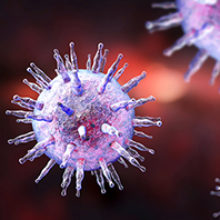Recently Independent Virology Researchers – networking for beginners
Issue: Fleming Prize Winners
20 October 2020 article

It is without doubt that, as a discipline, virology is strong in the UK. For anyone that attends the Microbiology Society Annual Conferences and goes to the virology talks and workshops, this is clear. Our research is cutting edge and world leading; moreover, our sense of community is tangible. Indeed, we think the latter is an essential part of UK virology’s success. But how is this fostered?
We’re frequently told that being part of this community and having a well-established network is paramount to success. However, for a junior researcher, whether a postdoc yearning for independence or a newly established independent researcher, breaking into this community can be daunting. Despite this, one can look around the room at a Microbiology Society event and see several tight-knit gatherings of ‘established’ virologists.
Recognising this, two newly independent virologists, Rachel Fearns (now Associate Professor, Boston University, USA) and Julian Hiscox (now Professor at the University of Liverpool, UK) took steps. Around 15 years ago, they established the annual Young Virologists’ Meeting, now known by the more inclusive ‘Recently Independent Virology Researchers’ (with the catchy acronym, RIVR) as a way of accelerating the network-building process. The premise was, as it still is, that virology researchers in their first years of launching an independent research career would come together for a small and welcoming symposium (in both the scientific and ancient Greek sense of the word). The aim was to provide a platform for discussing novel research, promoting new collaborations and exchanging experiences to successfully establish a career in virology. As recently said by Julian Hiscox, RIVR means, “You get to know what each other is doing and, importantly, to promote each other’s work.” Another highlight that continues with RIVR meetings is the keynote address by a well-established virologist who, in addition to summarising their significant contributions to virology, provides honest insights into their own career path and offers invaluable advice for managing the transition to successful independence.
There are two RIVR events each year: an evening meal during the Microbiology Society Annual Conference and the flagship meeting that takes place in January – the next RIVR meeting will be the sixteenth. Meetings are held over two days and are usually attended by 20–25 delegates and an established virologist (whose attendance is regularly sponsored by the Microbiology Society). Each RIVR presents their research, and because all delegates stay at the conference venue, there are plenty of opportunities for networking and establishing new collaborations. Indeed, over the years, casual conversations at RIVR meetings have led to several collaborative grants and numerous publications. Proudly, RIVR has been commended as being unique and a model that should be emulated in other fields, on platforms such as Twitter (#newPI) and Slack. From personal experience, RIVR meetings have proved to be transformational. At the Microbiology Society Annual Conference following your first RIVR meeting, you find yourself, quite naturally, part of those ‘tight-knit’ gatherings.
In recognition of the benefits of RIVR, we now encourage participation from researchers on the path to independence, such as researchers applying for independent fellowships or equivalent positions.
We are mindful of the barriers that carers and those with childcare responsibilities face when deciding to attend meetings. For these groups – including early career researchers who may not have their own grants – this decision can have a financial baring; so, we are extremely grateful to our previous sponsors (including Society journal, Journal of General Virology) for generously providing funds that go some way to overcoming these barriers.
If you think RIVR will benefit you, or if you would like advice on how to start a similar network, get in touch.
David J Hughes
Biomedical Sciences Research Complex, School of Biology, University of St Andrews, UK
[email protected]
Marieke Pingen
Institute of Infection, Immunity and Inflammation, University of Glasgow, UK
[email protected]
Image: iStock/Dr Microbe.


